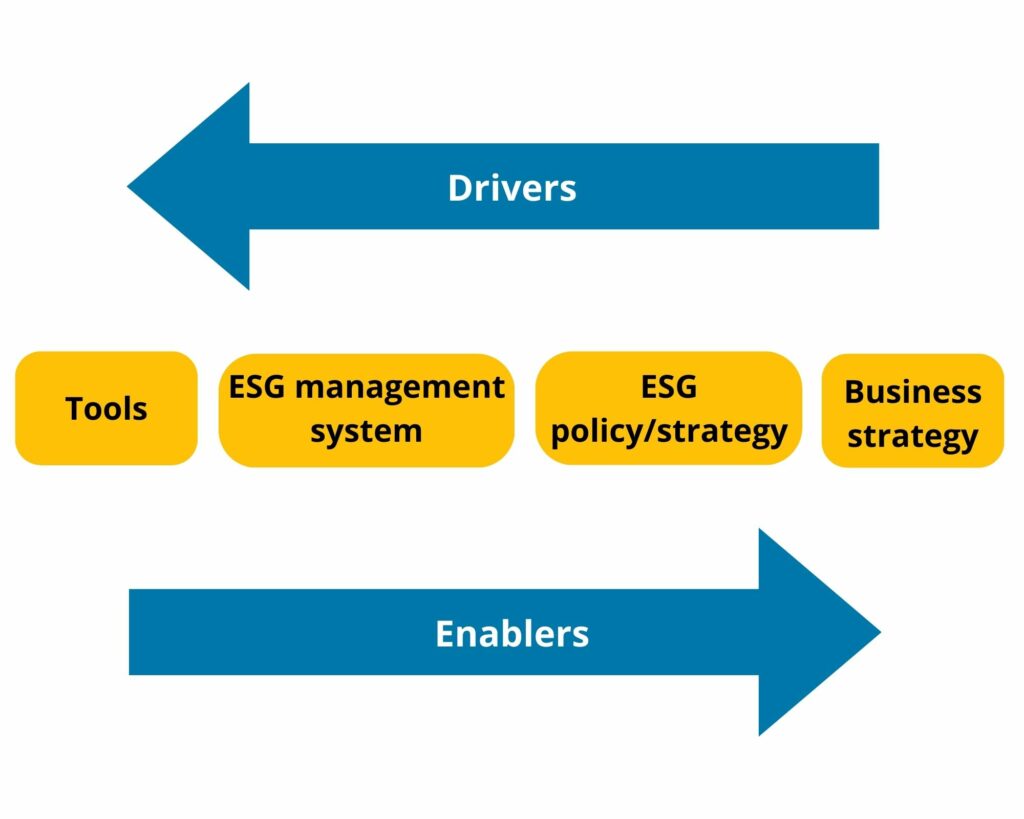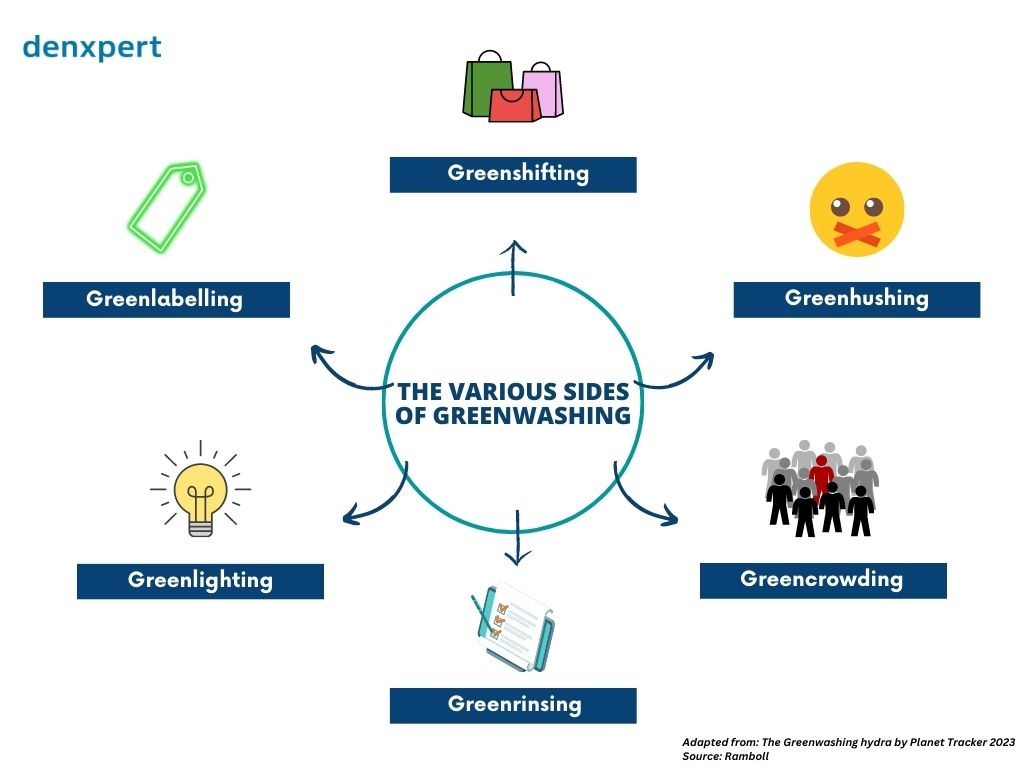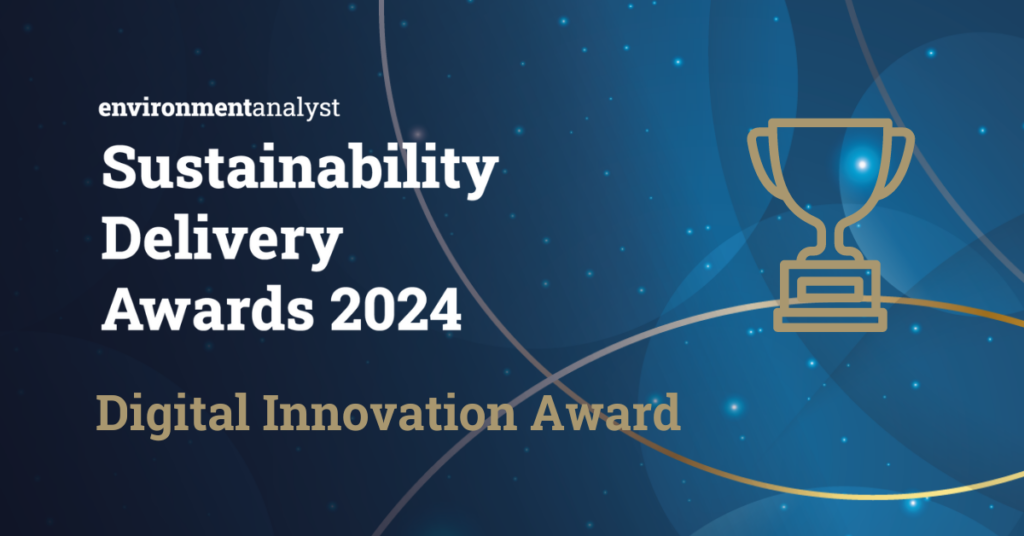Businesses must go beyond surface-level indicators and embrace a hollistic approach that integrates sustainability and social responsibility into their core objectives in order to make genuine progress in ESG impact. How to accomplish all of this? Read our article and find out!
ESG integration into business strategy
First of all, the ESG journey of a company should start with the integration of sustainability and social responsibility into the organization’s core business plan (see the figure below). This entails aligning ESG objectives with overall company goals and implementing them into decision-making processes at all levels and throughout the organisation. The ESG strategy’s priorities as well as the underlying management structure and tools required to implement the strategy are driven by the business strategy, allowing the ESG strategy to help the organisation accomplish its business goals.

Transparent ESG reporting
Secondly, companies need to make sure that their ESG reporting and disclosure are transparent, as it is critical for ESG impact improvement. They should also aim for providing relevant, accurate and comprehensive information on their ESG performance, which icludes disclosing ESG metrics, targets and and progress in a consistent and easy-to-understand format. To build trust with stakeholders, enhance accountability and informed decision making, transparent reporting is crucial, however, companies also need to make sure that their claims are geniune and supported by data, thus, cannot be accused of greenwashing. The following graphic shows the different types of greenwashing, which is becoming more and more prevalent. Companies can ensure that sustainability becomes a major driver of long-term success by including ESG issues into strategic planning.

Six types of greenwashing
- Greenshifting: When businesses put the responsibility on the consumer and imply that they are at fault.
- Greenhushing: The practice of corporate management teams under-reporting or concealing their sustainability credentials in order to avoid investor scrutiny
- Greencrowding: It relies on safety in numbers and is based on the idea that you may hide in a crowd to avoid detection. It is expected that the group will move at the speed of the slowest when developing sustainability policy.
- Greenrinsing: The practice of a corporation changing its ESG goals frequently before they are accomplished.
- Greenlighting: When a corporation uses its communications (including ads) to deflect attention away from other environmentally harmful actions by highlighting a particular green aspect of its operations or products.
- Greenlabelling: When marketers claim something is green or sustainable, but a deeper look reveals that their claims are false.
Did you know that the new Corporate Sustainability Reporting Directive (CSRD) will strengthen relations between society and sustainable businesses, through transparent information? The Taxonomy Regulation supporting the CSRD, sets up a classification system for sustainable economic activities to combat greenwashing of companies. Learn more about the 6 benefits of CSRD for companies!
Ongoing improvement and innovation
A commitment to ongoing innovation and development is necessary for meaningful advancement in ESG impact. Companies must routinely assess their ESG performance, set challenging goals, and put reformatting measures into place, which entails making investments in R&D, utilising cutting-edge technology, and investigating sustainable business structures. Organisations can take the lead in developing sustainable solutions and bringing about change in the entire sector by embracing innovation.
Stakeholder engagement
Engaging stakeholders is crucial for increasing ESG impact in a meaningful way. Stakeholders include employees, clients, investors, and local communities. Organisations should actively solicit feedback from stakeholders, pay attention to their comments, and incorporate their perspectives into their ESG strategies. This comprehensive strategy encourages cooperation, develops more support and unity, inspires creative ideas, and makes sure that ESG activities take into account the requirements and expectations of various stakeholders.
Collaboration and partnerships
Finally, collaboration is essential for making significant progress in the area of ESG impact. To jointly handle complex sustainability concerns, corporations should aggressively seek out partnerships with other industry participants, non-governmental organisations, governments, and other stakeholders. companies increase their effect and help bring about greater systemic change by exchanging best practises, information, and resources.
Conclusion
To sum it up, it takes a comprehensive and integrated approach that goes beyond surface-level measurements to make significant progress in ESG impact. Organisations can influence positive change and have a long-lasting effect on the environment and society while also achieving their business goals by integrating sustainability and social responsibility into business strategies, fostering collaboration and partnerships, encouraging transparency and accountability, pursuing continuous improvement and innovation, and engaging stakeholders. This calls for careful preparation as targets are created that will be reported against, as well as a focus on a subset of ESG themes that are most relevant – material- to a company and its mission.
Find out more about our how our denxpert ESG solution can help ESG-aligned business growth through better data, easier ESG reporting, and expert help
Author: Anna Réti – Marketing Specialist
Resources:
https://www.home.environment-analyst.com/
https://planet-tracker.org/wp-content/uploads/2023/01/Greenwashing-Hydra-3.pdf







